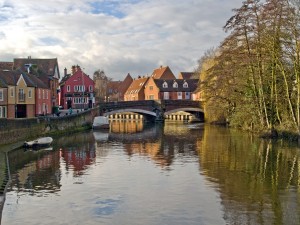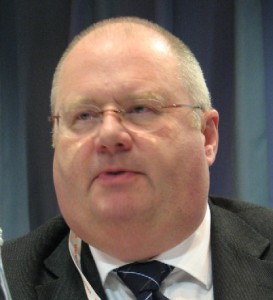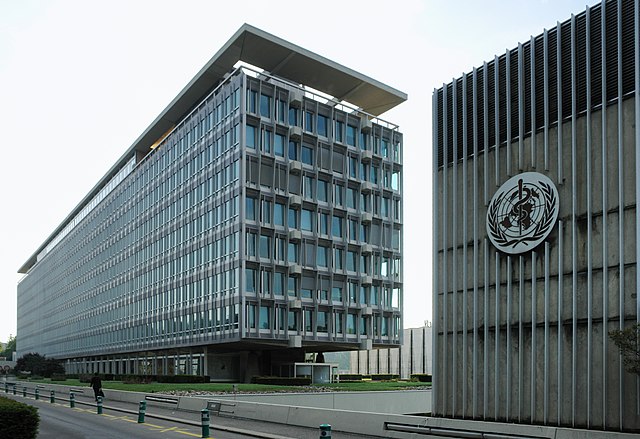Lawrence Hardy reflects on localism, politics and the relaxation of some town and country planning controls. He argues that Eric Pickles should leave localism to the locals and local politics to local people.

A colleague some years ago wrote an essay on walking through Norwich as poetry. And indeed he might. From Norwich Railway Station to the City Centre, from protected Mousehold Heath to the heritage of Magdalen Street, one passes fine examples of municipal socialism, not to mention Elm Hill, saved by the local Council with considerable foresight exercising its belief in both itself and its community. The historic City Hall, England’s largest fixed outdoor market, and pre Thatcher, the largest stock of council houses in the country bear testament to such vision from the leaders, past and present, of Norwich’s municipality. And also to be seen are the monuments to religion and capitalism – Skipper’s historic arcade off Gentleman’s Walk, the Norwich Union buildings, former shoe factories, riverside heritage, and not only 19th century capitalism and earlier but also 20th century counterparts. And two cathedrals and more medieval churches than anywhere else in Europe – the list goes on. A city shaped by its history and buildings; and by capitalism, religion, and municipal vision? Yes, and essentially by its people. Such contrasts – made by local people because I would argue that local people select or elect leaders who know better when it comes to deciding such things than do ministers and ministries of central government. That’s the true nature of localism.
And so too it is with the garden cities of England. My wife and I recently visited Letchworth and Welwyn Garden City in Hertfordshire. Built in the early 1900s and 1920s respectively, under the patronage of Ebenezer Howard, they stand today as living monuments to the triumph of the public good thanks to philanthropy, some self interest, and to effective town planning. Believing that ordinary people should not have to live in crowded slums, the garden city movement aimed to create self contained communities with green belts and areas for homes, industry and agriculture. Inspired by a utopian vision they influenced post war town planning, from new towns such as Milton Keynes to new ideas for existing cities such as in Norwich.
But this is a political blog and where does politics come in? Well. Everywhere. As we got off the bus at Welwyn bus station, run by the local council and located in the heart of the centre, the town’s buildings reveal a spacious and consistent design, a certain understated grandeur. From the dominating building and magnificent entrance that is John Lewis, to the open spaces and well planned streets, and the concentric rings of development and public space, we sensed something quite different. Here philanthropy, town planning, and inter war socialism had a big hand. The legacy is strong. Yet as we pass the banks and the small shops, department stores and cafes, they also have a place. We look on though at a new shopping mall – a monument to contemporary capitalism and palpably different in scale to the rest – a product perhaps of consumerism fuelled by corporatism?; a municipal desire to keep apace of the times?; a forlorn attempt to compete with the nearby temple to the ideology of BIG IS GOOD? – the enormous retail factory outlets, entertainment and leisure complex known as The Galleria and literally covering part of the A1M as that road passes through nearby Hatfield. Unlike the architectural style which I think of ironically as ‘fin de siecle Tesco twee’, as exemplified in so many nineties edge-of-town shopping developments, the Mall in Welwyn does actually work; The Galleria in Hatfield does not.
So, why poetry? In the way that words can inspire so can town planning and good architecture. And in one sense localism is poetry. Perhaps like a local dialect localism is unique. As we step back onto the bus and weave our way through the garden suburbs we pass 1930s art deco factories and homes, low rise flats of the fifties, well planned and maintained estates and private housing of the post war era, industrial developments of the sixties and business parks of the tweenies. Public parks and spaces are in abundance. I reflect on the harmony of such socially enlightened capitalism (if that’s not an oxymoron), philanthropy tinged with the self interest of those who lent Howard the money to develop these garden cities for the working classes, and the utopian dreams and socialist visions which delivered much. Of course not everything went well and not everything now is perfect. True, John Lewis and Waitrose are owned by their employees, we have conservation alongside organic change in these towns rather than commercialisation competing with their history, and a sense of harmony between the potentially competing land uses of residential, industrial, commercial, and open spaces. It was philanthropy which drove the garden cities movement and it is localism expressed through municipal endeavour and local politics which has secured the legacy for this and future generations. Somehow, Letchworth and Welwyn got it right, and broadly speaking appear to continue to do so. That is local political success. Rejoice!

But today, in 2014, a regime of recently introduced and relatively relaxed town planning controls for our towns and cities and for our countryside has been put in place by Secretary of State Eric Pickles. And put the future of everywhere in jeopardy. The risk is big. For the sake of short term economic benefit our heritage will be damaged. Generations to come may one day only read about the garden city movement in their history books. Incremental change can be devastating over time.
So, poetry may inspire. Good architecture and planning can too. Eric Pickles is not poetic – he’s a prose merchant and will destroy the ‘local dialect’ of localism by allowing the spread of ‘standard corporate development’ – like standard English overriding broad Norfolk. Eric, please, leave localism to the locals and local politics to local people.
Lawrence Hardy is a Senior Lecturer in European Politics at the University of East Anglia.






One thought on “Let’s leave localism and local politics to local people”